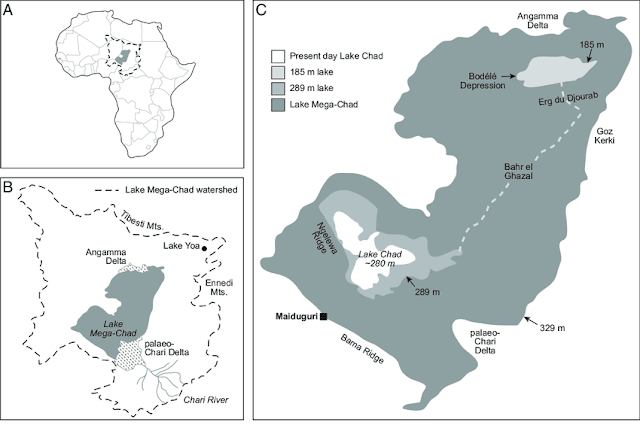Conflict and environmental change in Africa
Conflict in...
Africa
A 2007 United Nations Environment Programme (UNEP) Report suggested that future climate change could incite a number of new wars across Africa (Brown et al. 2007). The African continent is set to be the continent which experiences the most warming this century and the hydrological cycle is also expected to intensify. There is expected to be a widespread decrease in annual rainfall. The exception to this trend is East Africa, where rainfall is set to increase in intensity as well as variability. It is predicted that by 2025, in several African countries, demand will exceed the capacity of economically viable water resources as a result of population growth and climate change predictions (Ashton In Press).
West Africa, including the Lake Chad Basin
17 countries in the West Africa region share water from 25 transboundary rivers, leading to high interdependency between the countries (Niasse 2005). The Lake Chad Basin is shared by 8 countries, while the Niger river basin is shared by 11. In the region, there is an ongoing conflict between Fulani herdsmen and indigenous farmers in Nigeria (Adekola 2018). Alongside the drying-up of Lake Chad in the north-east, the Sahara is extending southwards by 600m/year in Nigeria towards the tropical south of the country. This has pushed Fulani Herdsmen further south. There has been a history of conflict here dating back to the 1960s, but this early conflict was restricted to northern Nigeria whereas current conflict extends further south. In Nigeria, environmental explanations of conflict are largely disregarded in favour of ethnic or religious explanations.
There has been significant coverage of conflict in the Lake Chad Region. Figure 1 is a video which brings together some of the themes I have discussed so far in my blog, such as agriculture, within the wider issue of the climate-conflict relationship.
Figure 1: A short video on conflict in the Lake Chad region.
Source: YouTube
East Africa
'Though the actions of industrialized nations are primarily responsible for global warming, its effects are being felt most heavily in less developed regions of the world such as East Africa, where climate change can be tied to detrimental environmental issues such as droughts and melting snowcaps' (Stuteville et al. 2008).
Figure 2: The percentage of of the Nile basin within each country (Sudan and South Sudan as one country).
Source: Nile River Awareness Kit
The history of conflict in the Nile Basin comes from unequal power relations as a result of the region's colonial past (Kagwanja 2007). The basin covers 10 riparian states; Burundi, DR Congo, Egypt, Ethiopia, Kenya, Rwanda, Sudan, South Sudan, Tanzania and Uganda and Eritrea as an observer. Figure 2 shows the percentage of the Nile basin in each of the riparian states. From 1890-1960, British power restricted the development of infrastructure that would reduce the flow to Egypt. In 1929 Egypt and Britain (on Sudan's behalf) signed the Nile Water Agreement (NWA) ratifying this agreement. 70 years after the implementation of the NWA, in 1999, the Nile Basin Initiative (NBI) was signed by all 10 riparian states for the sustainable and equitable development of the Nile's waters. In 2006, countries that make up the Nile River Basin initiated the Nile Basin Water Commission (NBWC).
In the Nile Basin, agriculture accounts for 75% of water withdrawals, with this figuring rising to 94% in Sudan (Swain 2011). In light of future climate change, there is uncertainty over the implications even at the river basin-scale. Although the more precise implications of climate change on the Nile Basin remain unknown, it is fairly certain that the Nile's flow will become more variable and experience a substantial reduction in flow over time. As a result, it is crucial that water agreements and management plans across the continent are adjusted to tackle the on-going issue of climate change.




Really enjoyed this post as I found the long history of conflict associated with water in Africa really interesting! In the Nile basin, if the predictions are true and flows do become more variable, do you think that this could reignite conflict between riparian states?
ReplyDeleteThis article from August of this year suggests that conflict in the region is set to continue, maybe even for generations as Ethiopia have threatened to take control of most of the waters of the Nile! This would have major implications for agriculture in Egypt and Sudan and hence food insecurity which could also lead to conflict in the region.
Deletehttps://www.scidev.net/global/water/opinion/renaissance-dam-water-conflict-will-pass-down-generations.html